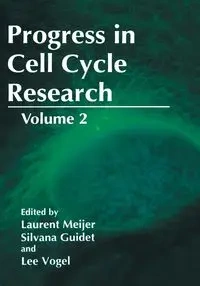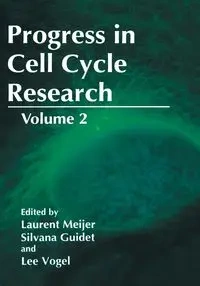Progress in Cell Cycle Research - Meijer Laurent
Progress in Cell Cycle Research - Meijer Laurent
- Volume 2
EAN: 9781461376934
Marka
Symbol
819HHX03527KS
Rok wydania
2012
Strony
300
Oprawa
Miekka
Format
17.8x25.4cm
Redakcja
Meijer Laurent
Język
angielski

Bez ryzyka
14 dni na łatwy zwrot

Szeroki asortyment
ponad milion pozycji

Niskie ceny i rabaty
nawet do 50% każdego dnia
Niepotwierdzona zakupem
Ocena: /5
Marka
Symbol
819HHX03527KS
Kod producenta
9781461376934
Rok wydania
2012
Strony
300
Oprawa
Miekka
Format
17.8x25.4cm
Redakcja
Meijer Laurent
Język
angielski

Now in its second year, Progress in Cell Cycle Research was conceived to serve as an up to date introduction to various aspects of the cell division cycle. Although an annual review in any field of scientific
investigation can never be as current as desired, especially in the cell cycle field, we hope that this volume will be helpful to students, to recent graduates considering a de1liation in subject and to investigators at the
fringe of the cell cycle field wishing to bridge frontiers. An instructive approach to many subjects in biology is often to make comparisons between evolutionary distant organisms. If one is willing to accept that yeast
represent a model primitive eukaryote, then it is possible to make some interesting comparisons of cell cycle control mechanisms between mammals and our little unicellular cousins. By and large unicellular organisms have no
need for intracellular communication. With the exception of the mating phenomenon in S. cerevisiae and perhaps some nutritional sensing mechanisms, cellular division of yeast proceeds with complete disregard for neighbourly
communication. Multicellular organisms on the other hand, depend entirely on intracellular communication to maintain structural integrity. Consequently, elaborate networks have evolved to either prevent or promote appropriate
cell division in multicellular organisms. Yet, as described in chapter two the rudimentary mechanisms for fine tuning the cell division cycle in higher eukaryotes are already apparent in yeast.
EAN: 9781461376934
EAN: 9781461376934
Niepotwierdzona zakupem
Ocena: /5
Zapytaj o produkt
Niepotwierdzona zakupem
Ocena: /5
Napisz swoją opinię

